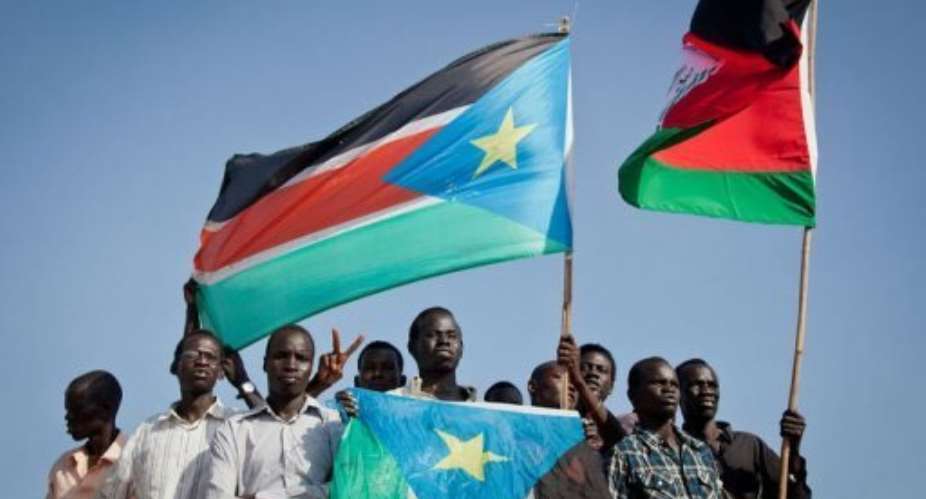JUBA (AFP) - A Sudanese air raid on a border city in South Sudan killed five civilians Saturday, a local official said, as Juba's army said it was still in control of the disputed oil hub of Heglig.
As each side blamed the other for the increasingly violent border dispute, the United Nations highlighted the plight of thousands of civilians who were forced to flee the region even before the latest clashes.
The latest hostilities are the worst since South Sudan's independence from Sudan last July under a 2005 peace accord and have brought the two former foes the closest yet to a return to outright war.
In Saturday's fighting, a Sudanese plane bombed Bentiu, capital of South Sudan's oil-rich border state of Unity, state government spokesman Gideon Gatfan said.
"Five traders have been killed," he told AFP. "The bomb fell next to a place where cars are being sold.
"We also found that six people were wounded, including one woman, and they are now admitted to Bentiu Hospital."
Gatfan said earlier that the raid failed to destroy its target, a bridge linking Bentiu to a road to the border, some 60 kilometres (35 miles) to the north, the theatre of fierce clashes in recent days.
It was the second air raid reported by South Sudanese officials on Bentiu since Thursday.
The South Sudan army said it was still in control of the oil hub of Heglig, part of Sudan's South Kordofan state, after Khartoum said it had launched an offensive to recapture the area seized by Juba's forces Tuesday.
Spokesman Philip Aguer told AFP the Southern army had repelled soldiers of the Sudanese Armed Forces (SAF) in the village of Kelet, some 40 kilometres from Heglig, on Friday and destroyed two tanks.
Aguer said Sudan's air force had bombed the border areas of Jau and Panakuach in Unity State on Saturday, as well as Heglig.
But in Khartoum, army spokesman Sawarmi Khaled Saad told reporters that their troops were within kilometres of the main town in the Heglig oil region.
"Now the fighting is going on and we want to destroy the enemy war machine completely," he said.
On Friday, he had said the counter-attack had begun and Sudanese forces were "close" to the town.
Khartoum has vowed to react with "all means" against a three-pronged attack it said was by South Sudanese forces.
South Sudan Information Minister Barnaba Marial Benjamin said they had called on the UN Security Council and the African Union to step in.
They needed "to ensure Sudan ends immediately the atrocities and the senseless killings of innocent civilians," said Benjamin.
On the fighting around Heglig, he said: "South Sudan will continue to defend itself against the aggression of Sudan, but we repeat again, we will not be dragged back into senseless war."
The Sudanese military in Khartoum could not be reached for comment.
But a foreign ministry statement said Sudan had told UN chief Ban Ki-moon on Saturday that it had no choice but to fight back against the "aggression" from South Sudan.
Foreign Minister Ali Karti made the remarks when Ban telephoned him Saturday evening, the foreign ministry said in a statement.
Ban asked Sudan to show restraint, the ministry said, but Karti replied that Sudan could not wait and had acted militarily "to push out the aggressor from its land."
The United Nations said Saturday that some 10,000 people had fled fighting in Heglig even before the renewed clashes this week.
The UN's Weekly Humanitarian Bulletin, citing the Sudanese Humanitarian Affairs Commission, said they had "scattered to various locations, including Heglig town and other areas further north."
The latest Bulletin covered the period to April 8 after initial fighting began in late March.
In Sudan's South Kordofan state, the government is also fighting ethnic minority rebels.
The United States and the UN have called for aid access throughout the South Kordofan war zone to avert a humanitarian crisis. Sudan has cited security concerns in severely controlling access for foreign relief agencies.
Journalists are not allowed to report independently in the area.
Some two million people died in Sudan's 22-year civil war, one of Africa's longest, before the peace deal opened the way to South Sudan's independence.





 Akufo-Addo did not order Overlord of Gonjaland to rise and greet him- Richard Ah...
Akufo-Addo did not order Overlord of Gonjaland to rise and greet him- Richard Ah...
 Many girls sleep with dogs for money — Mona Gucci
Many girls sleep with dogs for money — Mona Gucci
 Ejisu by-election: No election is small, easy but NPP will win — Frimpong Kodua
Ejisu by-election: No election is small, easy but NPP will win — Frimpong Kodua
 No president can take credit for constructing a road in Ghana; they’re taxpayers...
No president can take credit for constructing a road in Ghana; they’re taxpayers...
 Prof. Jane Naana has shaken Ghana's political foundation, causing NPP to run hel...
Prof. Jane Naana has shaken Ghana's political foundation, causing NPP to run hel...
 I've been receiving threats after I commended NPP for completing school projects...
I've been receiving threats after I commended NPP for completing school projects...
 Bawumia is ready to debate Mahama any day – Frederick Opare-Ansah
Bawumia is ready to debate Mahama any day – Frederick Opare-Ansah
 Register births at CHPS compounds; don't come to Accra – Birth & Death Registrar...
Register births at CHPS compounds; don't come to Accra – Birth & Death Registrar...
 We never said only 10 BVDs were auctioned – EC replies IMANI
We never said only 10 BVDs were auctioned – EC replies IMANI
 Election 2024: Akufo-Addo willing to trample on Ghana’s constitution – Mahama
Election 2024: Akufo-Addo willing to trample on Ghana’s constitution – Mahama
